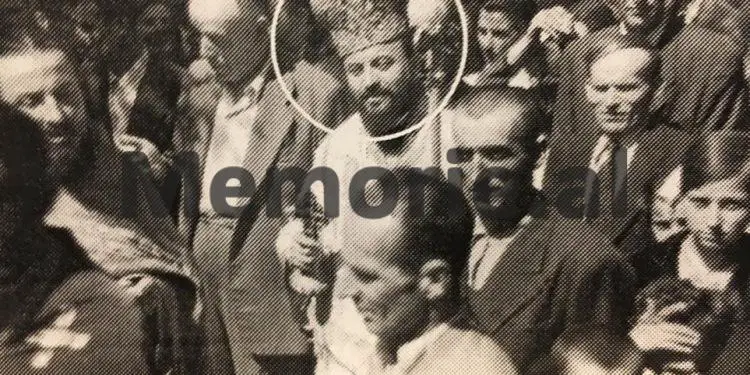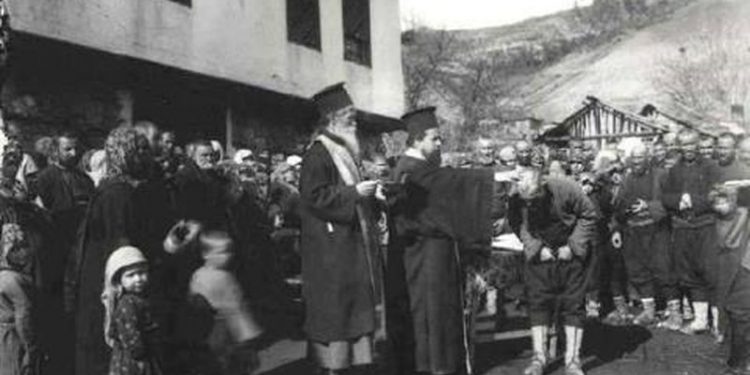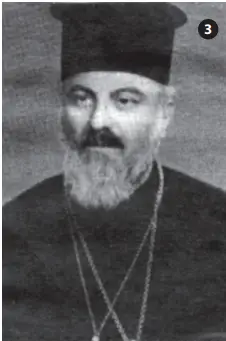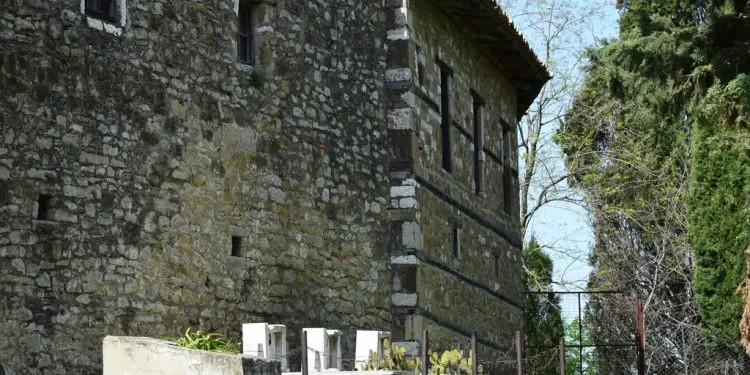By Mërgim Korça
Memorie.al publishes the unknown memories of Mërgim Korçë living in the USA (son of the former Minister of Education in the government of Mustafa Kruja who died in Burrel prison after a long hunger strike), for his friend, Monsignor Irene Banushi, Bishop of the Orthodox Clergy who served in the Ardenica Monastery until 1967 when the communist regime closed places of worship. The conversations they had while they were in the district of Lushnja and what Monsignor Irene told him about the figure of Enver Hoxha and his crimes, starting with the elimination of Qemal Stafa, Bahri Omar and then his opponents and friends.
As well as the memories of Pandeli Stringa, the son of the well-known lawyer, Dr. Spiro Stringës, (who in the Special Court defended some of the most famous characters who were convicted there) for Monsignor Irene Banushi, a friend of their family during the period they lived in the district of Lushnja, where the famous Bishop had served at the Monastery of Ardenica after suffering ten years in the prisons of the communist regime, and in 1967, he was sent to work in a construction company as an accountant.
Without a doubt, His Grace, Bishop Irene Banushi, ranks among the most prominent figures of the Albanian clergy who were persecuted by the savage communist dictatorship. There was no way it could have happened otherwise, because he never wavered in his convictions no matter the circumstances. His principle was, as he had always expressed himself in the scriptures, the application of the rules of the Albanian Orthodox Autocephalous Church, and the application of the sacred canons, as well as obedience to the laws of the state. As long as they did not harm the sacred Institute of National Life.
Given that his attitudes have always been characterized as coherent with his convictions, it is no wonder that he was persecuted by both the occupier and the communist dictatorship. Regarding the diverse spiritual world as well as episodes from the life of His Grace Irene Banushi, it has been written other times. With this article I would like to present some personal recollections from the discussions with Monsignor Irineu, regarding his views, some of which he viewed retrospectively and some of which were predictive by himself.
In such discussions he emphasized and did not stop repeating, saying: “Life has taught me never to be categorical in interpretations of time periods of events, or various personal actions. “It often occurs to me today to give interpretations that are tantally different from what I have given decades ago, for the same circumstances and with the same people, although no new fact has enriched my circle of knowledge about them.”
Ireneu always emphasized that for the people as well as for our nation, the establishment of the official Albanian state had created many problems, both new and complex. But these were nothing to do with the problems that arose after the occupation of Albania by fascist Italy. He himself was so prominent at the time for his anti-Italian stance that he was imprisoned and exiled to the lost village of Redodesco in Mantua, Italy, from where he was released a year after the intervention of His Grace Christopher Kisi., the head of the Albanian Orthodox Autocephalous Church to Francesco Jacomoni.
After his release with his functions, Monsignor Irineu was distinguished for his interventions in favor of anti-fascist detainees, somewhere thanks to the friendship and contacts he had with leading personalities of the time, and thanks to his position as Bishop. This is exactly the moment that Monsignor Irineu called delicate for the fate of Albania, about which he expressed: “The international situation itself was extremely complicated. Normally it suited us to be allied with the Allies as Axis adversaries. But on the other hand, the allies were allied with the Soviet Union a communist state and deeply anti-religious, which in the distant future could have become very dangerous for our country as it was. This unclear situation was the reason why a large part of the youth and the people supported the Albanian National Liberation Movement. In the meantime, they became associated with the National Liberation War, elements that had never had anything to do with it, starting with Gjergj Kokoshi, my very good friend. Gjovalin Luka, progressive intellectual and sucker of a rich family, Riza Dani, educated and wealthy intellectual and religious who had nothing in common with communism and many others “.
In this context, Monsignor Irineu, discussing the time when maintaining political orientation was in those special conditions, was very difficult, showed that Qemal Stafa himself, whom His Grace had as a childhood friend. He said about Qemali: “Enthusiastic about the Communist Manifesto, he became one of the founders of the Communist Party of Albania, but I am convinced that the bread that the Almighty God gives me to eat, that Qemali had been alive, long after the communists took over power, he (Qemali) would have been eliminated, not to mention that even on May 5, 1942, they themselves deconspired him and as a result he was killed. (On this occasion, I also told His Grace a memory of mine about a very meaningful fact that sheds light and has to do with how Qemal Stafa was killed, but which in the current article goes off topic about this point). He, after a long silence, when he started, seemed to me like a hazelnut, but then hand in hand I realized where he was aiming.
On one occasion we were invited to dinner at the Sylari family in Lushnje, a family that welcomed and conveyed his kindness to Irineu, with much respect and love at the time when his relatives were leaving. One day I was traveling by train to Tirana with me and Monsignor Irineu. He went to meet a friend of his, Dhimitër Beduli, whom he never took out of his mouth. It was the period of the Class War, (as the dictator liked to pronounce it) which was presented with peaks and shallowness, toughening and softening. It was as if he were addressing a tide.
I tell Irineu, that perhaps the dictator is filled with the curse he had found our people through this Class War. And he gave me an answer that I can never forget, he said to me: “Like all dictatorships in the world, we are no exception. Initially, Enver Hoxha, after starting to eliminate his opponents, and then secretly his friends, who in the future he thought could leave him in the shadows. When he took power, he made his friends tremble (so that they would understand that he was not playing games).
He was ruthless in killing his sister’s husband, who had kept him and his companions on bread. At the end of this period, he began to sentence to death his deputies and collaborators, and some even forced him to commit suicide. And at this stage of the crime that he has reached, the fear of his shadow no longer stops his hand, and deeper and deeper he will continue the violence by narrowing the close circle of his friends. So, do not think that the class war is going to get worse, but it is going to come and get worse, until his death. “Woe to this people for not seeing me longer.”
And after this statement silence fell and Monsignor Irineu looked me in the eye, but your mind was elsewhere. At this time the train was giving signs that it was approaching the terminal station in Tirana and the conversation with Monsignor Irineu ended that day. We parted with him on the train so as not to be noticed. He came down and mingled with the crowd of people who were coming out. I followed him to see him and said to myself, “How ordinary he looks among the ordinary. And his great wisdom and knowledge were nothing but the greatness and strength of his character. His grace knew how to suffer the day to stand and most importantly know and forgive.
By Pandeli Stringa
Memoirs of Pandeli Stringa: How I met Monsignor Irene Banushi in Lushnja
I knew Uncle Ireneu (as the people of Lushnja and Ardenica called him) in his civil life in the city of Lushnja in June 1967. This was the acquaintance in adulthood, as Ireneu was a friend of our family and especially of his father. tim (lawyer Spiro Stringës). As a senior official of the Autocephalous Orthodox Church of Albania, he came to our family as a servant of God for religious holidays. What removed Monsignor Irene Banushi from his religious duties was the brutal communist dictatorship, which imprisoned him twice for 5 years as well as the subsequent long internments in Shënavlash and Ardenica.
In Lushnje he was known as a simple man and worked as an accountant in the Construction Company where he excelled in knowing the rules and requirements as well as in performing the task with great accuracy. Thanks to his culture, intelligence and personal characteristics, such as simplicity and generosity, respect for others, created a special respect for the people of Lushnja and the inhabitants of Ardenica, who honored him both at work and in his private life.
Some families from Lushnja, such as Sylari, Libohova and Gallai, opened their doors to him and offered him family lunches and dinners, respecting him wholeheartedly. In all cases Uncle Ireneu was sober, cold-blooded, sweet, smiling, elegant in conversation, and not at all boring. He adapted very quickly to the circumstances that arose. He had no pretensions and enjoyed what opportunities created him and with his benevolent companions he tried to be a cavalier. He always came out plain and clean, and never approached the Party people in order to protect them from the public, as Lushnja was the place of the internees.
Usually Uncle Ireneu spent dinner at the restaurant “Myzeqeja” where I met him almost every night. He knew who he was talking to and what he was talking about. Ireneu was very quick and accurate in his judgments, since he was very much beaten with life problems. Although suffering from tuberculosis and diabetes, he practiced medicine within his economic and financial means.
Prison and exile had affected his health and left their mark on his personality, forcing him to be hospitalized in October 1973. There I met him fondly for the last time, as it was not long before November 25th. he parted from this life. His loss was a great tragedy not only for the Albanian Orthodoxy but also for Albania itself./Memorie.al

















